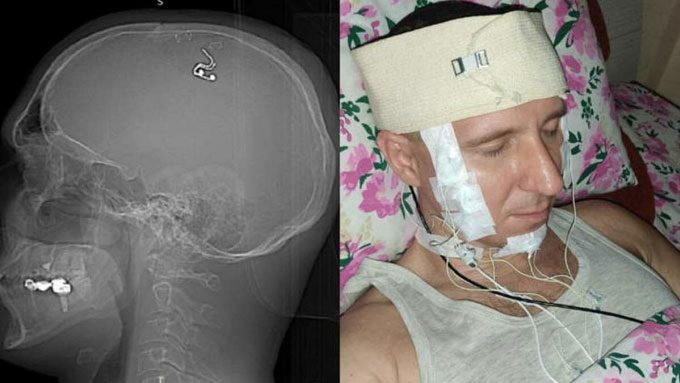Michael Raduga, a Russian scientist, sparked controversy by claiming to have performed a brain surgery on himself in his own home.
Raduga is the founder of a center dedicated to researching sleep-related issues, particularly sleep paralysis and dreams. He is not a doctor and does not hold any qualifications in neurosurgery.
The man decided to perform the surgery on himself by implanting an electrode into his brain to control dreams, aiming to induce “lucid dreams.” This type of dreaming occurs when one is aware that they are dreaming and can manipulate their thoughts and emotions. This can help reduce nightmares, enhance awareness, improve problem-solving skills, as well as boost creativity and learning capabilities.
In a video capturing the surgery, Raduga stitched his scalp back together using paper clips and employed a drill he found in a hardware store to operate on the back of his skull. He reported losing over a liter of blood during the procedure.
This life-threatening research has not been published in any medical journals and has not received support from universities. Raduga’s followers in Russia consider him brave for pushing boundaries to achieve his goals. However, neurosurgeons warn that this is an extremely dangerous action.
Alex Green, a neurosurgical consultant at the University of Oxford, England, stated that this act poses serious risks to life. “A lot of complications could arise. For example, bleeding from the cortical veins, blood vessels in the brain, stroke with permanent disability, or even death,” he noted.
Raduga himself acknowledged that about 30 minutes after the self-surgery, he wanted to give up due to the excessive blood loss and feared he would faint. However, after completing the surgery, he was able to shower and work for approximately 10 hours continuously without issues.

Michael Raduga after self-performing brain surgery. (Photo: Michael Raduga).
Prior to the surgery, Raduga did not inform anyone of his plans. He only prepared by watching hours of brain surgery videos on YouTube and conducting experiments on a few sheep. He attempted to implant a platinum and silicon electrode into his brain, believing that this procedure could trigger more lucid dreams.
Although Raduga has not reported any side effects following the procedure, neurosurgeons believe he risks developing epilepsy in the long term if any scarring occurs in the cortex.
“I am very glad to be alive, even though I was prepared for death. For many, what I did seems like a hobby. But imagine those who are paralyzed and unable to do anything or experience life. This procedure would lead you into a lucid dream, where you can do anything you want, like eating and having fun,” he said.


















































